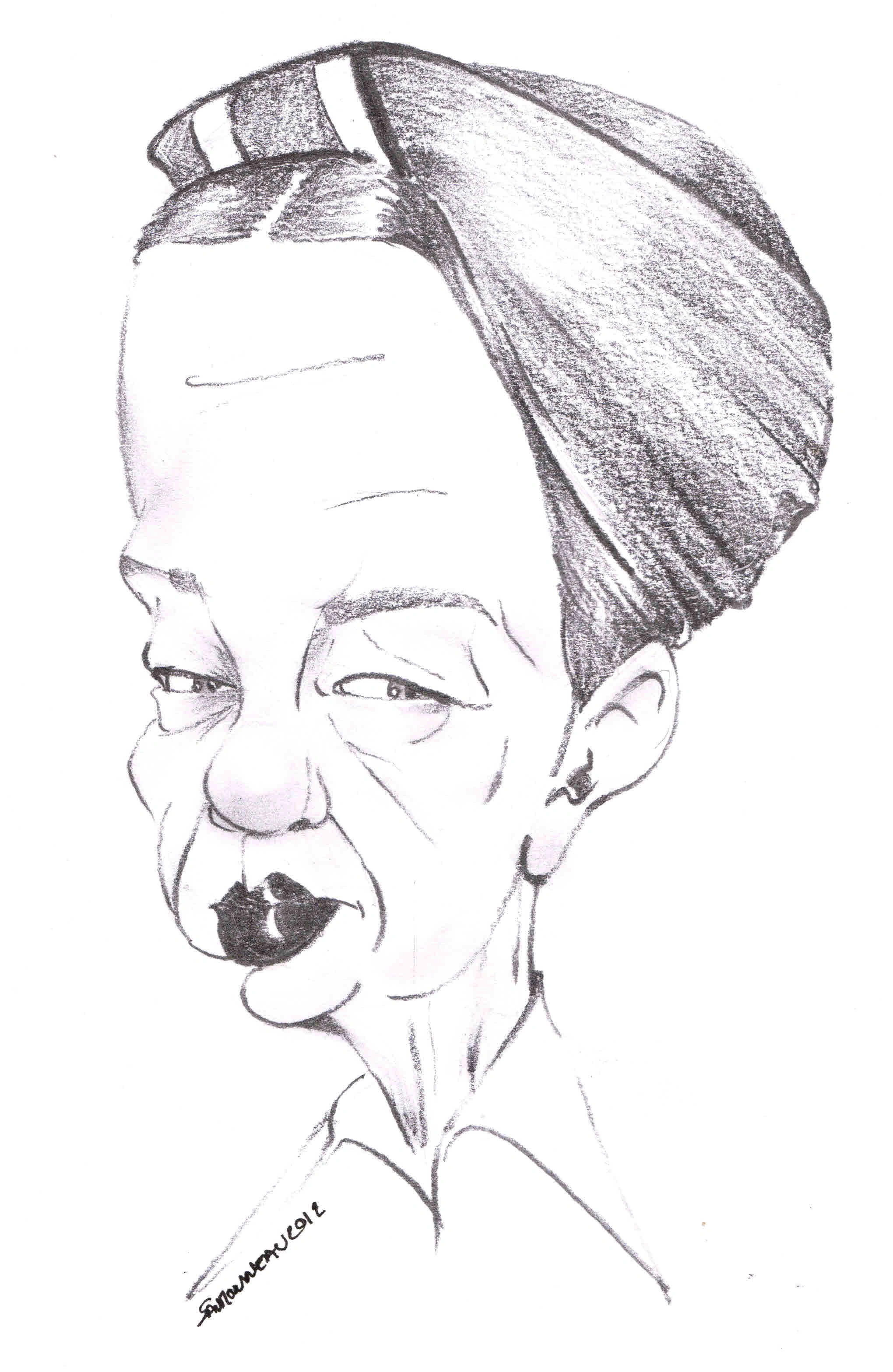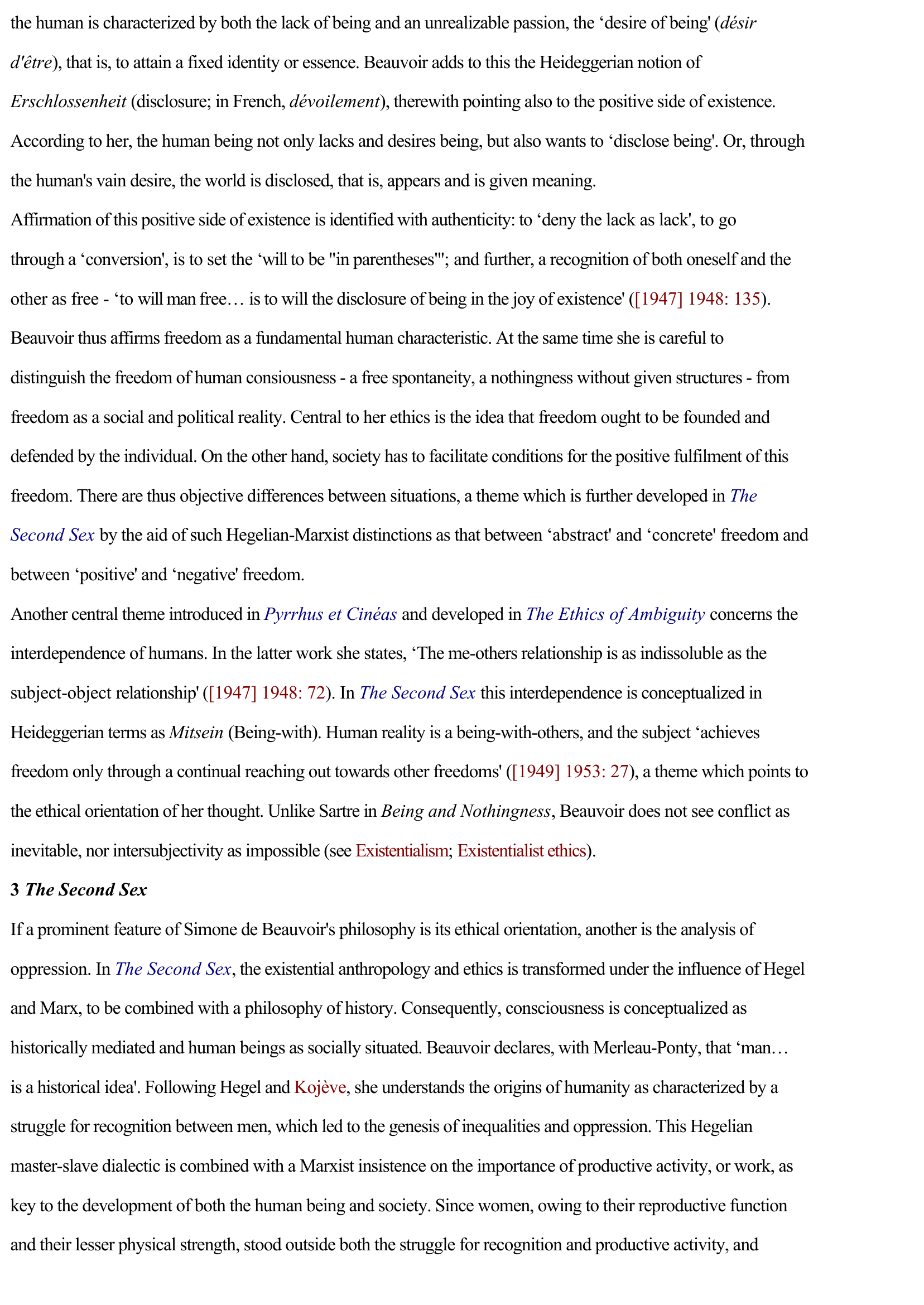Simone de Beauvoir
Publié le 22/02/2012
Extrait du document


«
the human is characterized by both the lack of being and an unrealizable passion, the ‘desire of being' (désir
d'être ), that is, to attain a fixed identity or essence.
Beauvoir adds to this the Heideggerian notion of
Erschlossenheit (disclosure; in French, dévoilement ), therewith pointing also to the positive side of existence.
According to her, the human being not only lacks and desires being, but also wants to ‘disclose being' .
Or, through
the human's vain desire, the world is disclosed, that is, appears and is given meaning.
Affirmation of this positive side of existence is identified with authenticity: to ‘deny the lack as lack' , to go
through a ‘conversion' , is to set the ‘will to be "in parentheses" '; and further, a recognition of both oneself and the
other as free - ‘to will man free… is to will the disclosure of being in the joy of existence' ([1947] 1948: 135 ).
Beauvoir thus affirms freedom as a fundamental human characteristic.
At the same time she is careful to
distinguish the freedom of human consiousness - a free spontaneity, a nothingness without given structures - from
freedom as a social and political reality.
Central to her ethics is the idea that freedom ought to be founded and
defended by the individual.
On the other hand, society has to facilitate conditions for the positive fulfilment of this
freedom.
There are thus objective differences between situations, a theme which is further developed in The
Second Sex by the aid of such Hegelian-Marxist distinctions as that between ‘abstract' and ‘concrete' freedom and
between ‘positive' and ‘negative' freedom.
Another central theme introduced in Pyrrhus et Cinéas and developed in The Ethics of Ambiguity concerns the
interdependence of humans.
In the latter work she states, ‘The me-others relationship is as indissoluble as the
subject-object relationship' ([1947] 1948: 72 ).
In The Second Sex this interdependence is conceptualized in
Heideggerian terms as Mitsein (Being-with).
Human reality is a being-with-others, and the subject ‘achieves
freedom only through a continual reaching out towards other freedoms' ([1949] 1953: 27 ), a theme which points to
the ethical orientation of her thought.
Unlike Sartre in Being and Nothingness , Beauvoir does not see conflict as
inevitable, nor intersubjectivity as impossible (see Existentialism ; Existentialist ethics ).
3 The Second Sex
If a prominent feature of Simone de Beauvoir's philosophy is its ethical orientation, another is the analysis of
oppression.
In The Second Sex , the existential anthropology and ethics is transformed under the influence of Hegel
and Marx, to be combined with a philosophy of history.
Consequently, consciousness is conceptualized as
historically mediated and human beings as socially situated.
Beauvoir declares, with Merleau-Ponty, that ‘man…
is a historical idea' .
Following Hegel and Kojève , she understands the origins of humanity as characterized by a
struggle for recognition between men, which led to the genesis of inequalities and oppression.
This Hegelian
master-slave dialectic is combined with a Marxist insistence on the importance of productive activity, or work, as
key to the development of both the human being and society.
Since women, owing to their reproductive function
and their lesser physical strength, stood outside both the struggle for recognition and productive activity, and.
»
↓↓↓ APERÇU DU DOCUMENT ↓↓↓
Liens utiles
- Lecture linéaire extrait Le Deuxième Sexe de Simone de Beauvoir
- Mémoires d'une jeune fille rangée de Simone de Beauvoir (analyse détaillée)
- BELLES IMAGES (Les). Simone de Beauvoir (résumé)
- Simone de BEAUVOIR Tout compte fait - Texte seul
- MÉMOIRES D'UNE JEUNE FILLE RANGÉE Simone de Beauvoir (résumé)

































